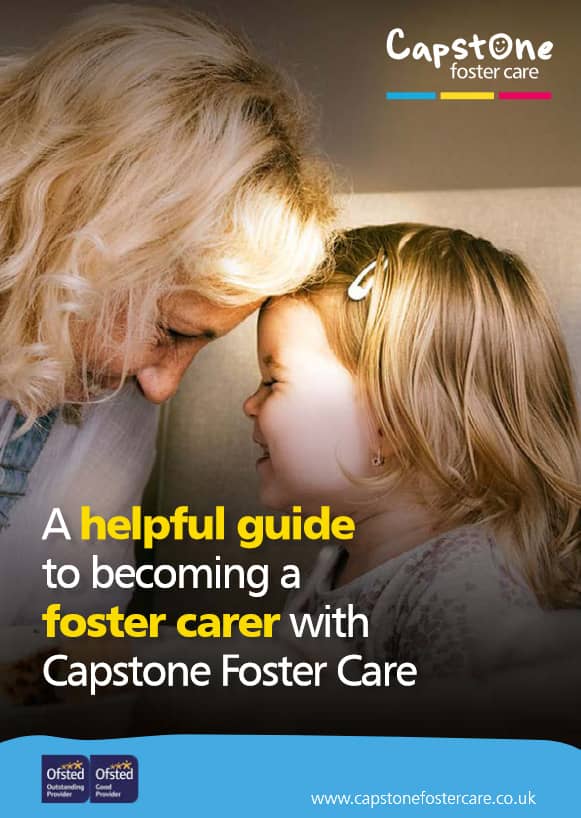


Fostering a disabled child
The role of an independent fostering agency
How to choose a foster care agency
Can I choose who I foster?
What are the benefits of fostering with an independent fostering agency?
What happens when a child is taken into care?
Fostering process: what happens on an initial home visit?
Fostering with local authority vs independent agency
A complete guide to becoming a foster carer
How Are Children in Foster Care Matched with Carers?
Foster Care Budgeting Tips
Becoming A Foster Carer
What is a Care Leaver?
What is a Foster Carer?
Fostering Regulations
How long does it take to become a Foster Carer?
What are the Foster Care requirements?
Changing IFA - Transferring to Capstone
8 reasons why a child may be taken into care
Fostering as a Career
Can you foster if you smoke or vape?
A guide to fostering assessments
LGBTQ+ Fostering
Equality, Inclusion & Anti-discriminatory Practice in Foster Care
What can disqualify you from foster care?
Can you foster if you’re on benefits?
Top transferable job skills to become a foster carer
Fostering as a same sex couple
Fostering while renting
Can you foster if you have mental health issues?
Is there an age limit for fostering in the UK?
Do foster carers get a pension?
How to foster a child: A step by step guide
How do DBS Checks Work?
Can I foster if...?
Mythbusting the top 10 Foster Care Myths
Can I foster if I am disabled?
LGBT Fostering Mythbusting
Can I foster if I have pets?
Can I Foster A Child?
Can I Foster and Work?
Can you Foster with a Criminal Record
Can Single People Foster?
LGBT Family and Foster Care
Fostering across Cultures
Muslim Fostering
Christian Foster Care
Sikh Fostering
Empty Nest Syndrome and Foster Care
Can I Foster?
What is the difference between residential care and foster care?
Fostering Babies and Young Children
What is Kinship Care?
Fostering Babies - Myths
Focusing on Parent & Child Fostering
Fostering Siblings
Fostering Teenagers
Fostering Teenagers - Breaking down the Myths
Fostering Unaccompanied and Asylum Seeking Children
Mother and Baby Foster Placements
Private Fostering
How does therapeutic fostering work?
Young Children Fostering Placements
Difference between short and long-term fostering
Types of self-harm
A Guide to the Foster Care Handbook
Reunification and Birth Parents: A Guide for Foster Carers
What is an EHC Plan? A Guide for Foster Carers
How to prepare a child for becoming a care leaver
Children who foster: impact of fostering on birth children
Fostering LGBTQ+ Youth
How to prepare your home for a foster child
How to help a lonely child: A Guide for Foster Carers
What are the National Minimum Standards for Fostering Services?
10 tips for foster children's education
How to prepare your foster child for secondary school
Tips for coping when foster placements end
Tips for foster parents during Coronavirus
What happens if foster parents get divorced?
5 ways to manage Mother's Day with foster children
Tips for managing foster children's bedtime routines
How to handle foster child bullying
Fostering allowances and the gender pay gap
What discounts can foster carers get?
How to adopt from Foster Care
5 ways to manage Father's Day for children in foster care
8 most common fostering challenges
FosterTalk Membership with Capstone Foster Care
Supporting foster children's contact with birth families
A guide to independent fostering
Keeping Children Safe Online: A Guide For Foster Carers
Movies About Foster Care
Play-based learning strategies for foster carers
A Guide to the Staying Put Program
Why Foster Parent Wellbeing Matters
How to deal with empty nest syndrome
How to recognise signs of depression in foster children
Can you take a foster child on holiday?
Tips and advice on fostering with a disability
10 tips on connecting with your Foster Child
Fostering vs Adoption - What's the difference?
How Fostering can change a future
How to adopt from Foster Care
How to encourage children to read in Foster Care
How to prepare a Foster Child's bedroom
Reading and Storytelling with Babies and Young Children
Supporting Children's Learning
The 20 most recommended books Foster Carers and young people should read
Things you can do when your children leave home
The impact of early childhood traumas on adolescence and adulthood
Anxious Disorders in Foster Children
What is sexual abuse and sexual violence
Foster Child behaviour management strategies
Foster Parent Advice: What to expect in your first year of fostering
Capstone's twelve tips at Christmas
10 celebrities who grew up in Foster Care
Could Millenials be the solution to the Foster Care crisis?
Do you work in Emergency Services?
Form F Assessor and Assessment Training
Foster Care Fortnight
Improving Children's Welfare - Celebrating Universal Children's Day
New Year - New Career - Become a Foster Carer
Young People Charities
Empty nest syndrome is a phenomenon that parents experience when their last child leaves home. This can lead to feelings of sadness and loss and, although this is not a clinical diagnosis, it has proven symptoms which correlate to the experience of letting your children go.
Adjusting to the empty nest period can be tricky – that’s why we’ve put together this guide which highlights how to get through empty nest syndrome with a few ideas, such as becoming a foster carer. But first, it’s important to understand the signs and symptoms of empty nest syndrome:
One of the best ways to deal with empty nest syndrome? Becoming a foster parent.
Fostering as a way to deal with empty nest syndrome not only helps change the lives of young people, but it can also effectively fill the void of lack of purpose, sadness and loneliness – all the symptoms listed above that you may experience when your child has flown the nest. Recent statistics show that the UK needs at least 8,000 carers in order to support the demand of children in care – and one of the key requirements for being able to foster is having experience caring for children, which, as an empty-nest parent, you would already have.
Another key element in the process of your last child leaving home is the prospect of having spare bedrooms. In order to foster a child, another one of the fostering requirements is that you must have a spare bedroom. It could potentially cause pain to walk into your children’s bedrooms, seeing old memories of your children’s childhood – so instead, why not create a new room fit for a foster child to stay? Depending on how many spare bedrooms you have, you could even foster sibling groups too if you wanted to make use of the spare bedrooms in your home.
There are various types of foster care that you could go into – such as short-term fostering, long term fostering or emergency fostering. However, whatever you choose, you’ll be making a substantial difference a young person’s life – which can be extremely rewarding and fulfilling. You will also be given a competitive fostering allowance for looking after children in care. Discover more about how to apply to become a foster carer today.
For more information about combatting the empty nest syndrome with foster care, read our helpful guide. We’ve also put together a list of the top 10 things you can do when your children fly the nest – from travelling to learning how to cook, discover other ways to deal with empty nest syndrome.
To learn more about what empty nest syndrome is and how fostering a child can help alleviate some of these symptoms, get in touch with a member of our friendly team for an informal chat about fostering today.
If you’ve got any questions or would like to find out more about fostering with Capstone, fill out the form below.
An experienced fostering advisor from your local area will then be in touch.

Start the conversation today. Our team of friendly advisors are on hand to answer any foster care questions you may have. We can offer you honest and practical advice that can help you decide if becoming a foster carer is the right path for you.


